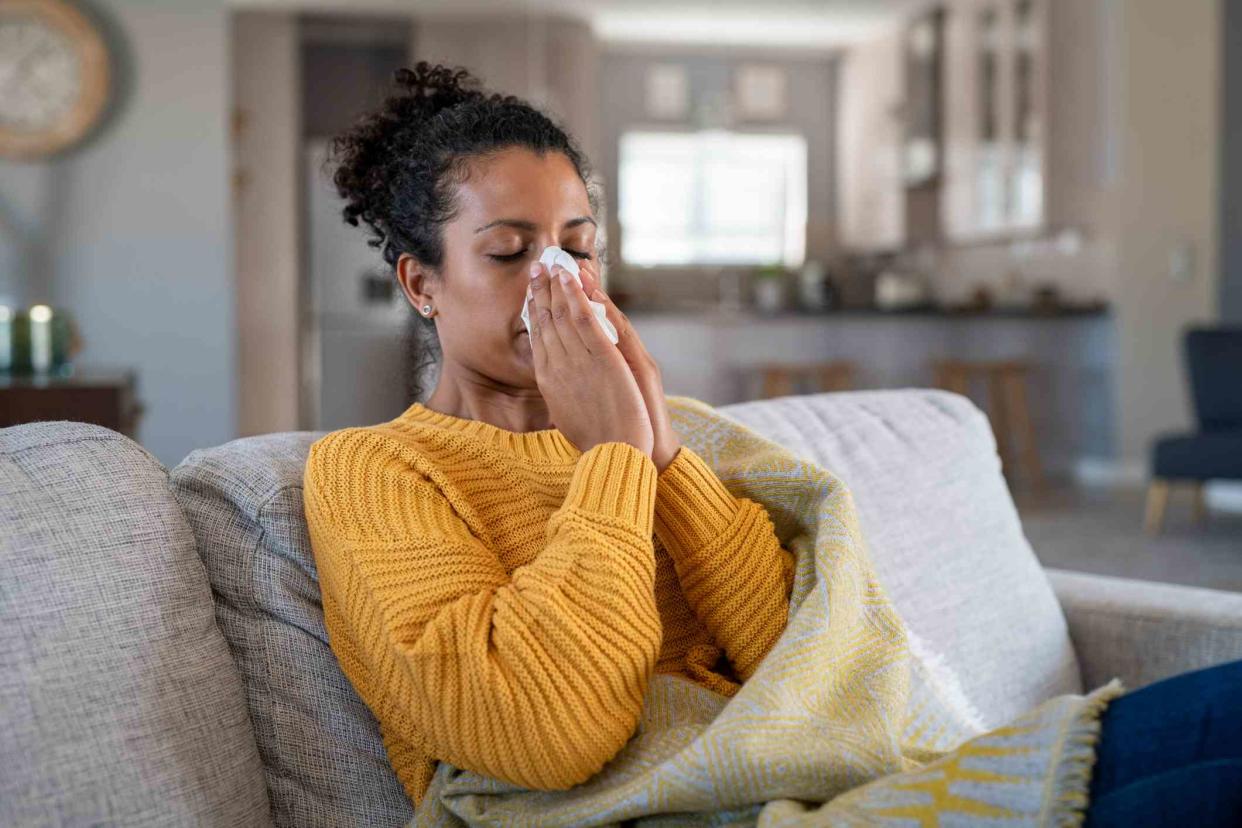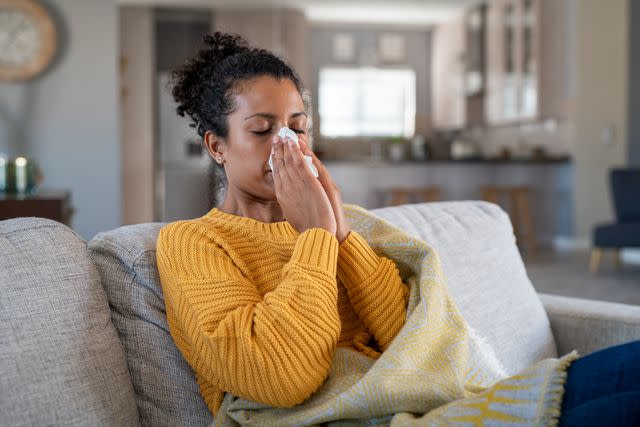How to Stop a Runny Nose

Ridofranz / Getty Images
Medically reviewed by Kashif J. Piracha, MD
To stop a runny nose, you need to know what’s causing it. A mild runny nose from a cold will usually get better on its own with rest and plenty of fluids, while a chronic runny nose from allergies might need to be treated with medication.
This article covers home remedies and medications that can help with a runny nose, as well as the possible complications that can come from letting a runny nose go untreated.

Ridofranz / Getty Images
What Causes a Runny Nose?
Many things can cause a temporary runny nose (rhinorrhea) that comes on fast:
Viruses (e.g., colds, the flu, COVID-19)
Sinusitis
Certain foods and drinks
Medications
Long-lasting (chronic) or recurring causes of a runny nose include:
Hormones
The mucus drainage can vary depending on the cause of your runny nose. If you have a virus, your mucus can be thick and yellow. If allergies are causing your runny nose, your mucus is more likely to be clear and accompanied by other allergy symptoms like itching and sneezing.
Home Remedies to Stop a Runny Nose
Often, at-home treatments are enough to help with a runny nose. Things like steam and warm drinks can clear your nasal passages, help them drain, and relieve pressure.
Warm Drinks
If you have a viral infection or postnasal drip that’s giving you a runny nose and other symptoms like a sore throat, having something warm to drink can be soothing.
Fluid helps your immune system work better by making it easier for nutrients to get to your body's cells. It can also help thin mucus. If you’re feeling sick, choose warm beverages that are nutritious and naturally hydrating, like chicken broth, herbal tea, and warm water with honey and lemon.
Facial Steam
If you’re congested, leaning over a bowl or pot of hot water may help loosen nasal mucus and let it drain more effectively.
To use steam for a runny nose:
Pour some boiled water into a bowl or pot.
Make sure the water is on a steady surface so it will not spill or splash. Never place hot water on your lap. Put it on a firm, uncluttered surface away from pets and children.
Next, drape a towel over your head and lean over the bowl with your face about a foot above the water.
While you breathe in the steam, you can avoid burns by staying far enough away from the surface of the water.
Since there is a risk of burns, you should not use facial steam to help with a child’s runny nose.
Steam with Essential Oils
While some people recommend adding essential oils to steam to help with congestion, you should know that the Food and Drug Administration (FDA) does not regulate these oils.
Hot Shower
A hot shower works like steam inhalation. You can take a shower or sit on the floor in the bathroom and breathe in the mist around you.
A steamy bathroom is safer for children than other ways to breathe in steam. A shower is less likely to lead to accidental spills of very hot water that can burn. However, children should always be supervised when in a bathroom where there is running hot water.
Rest
A runny nose is often a sign that your body is fighting an infection. You need to get plenty of rest to help your immune system do its job. Try to get to bed on time or even earlier when you’re fighting a cold or other illness. You may even find a daytime nap helpful.
Warm Compress
A warm compress on your face can help loosen mucus, and encourage it to drain. You can make a simple warm compress by running a washcloth under warm water and placing it over your nose and eyes for 10 to 15 minutes.
Humidifier
Humidifiers add moisture to the air. This can help loosen mucus and make it easier for the fluid to drain out of your nose.
Humidifiers are convenient because you can run them in your bedroom while you’re asleep. Just make sure to keep your humidifier clean, as moist places can be hotbeds for mold and bacteria to grow.
Neti Pot
A neti pot is a container that can be used to help clear nasal passages. It washes out (irrigates) mucus and flushes the sinuses.
You should only use distilled, sterile, or boiled and cooled water for a neti pot. Tap water may have organisms in it that could cause infections when they get into your nose.
To use a neti pot, follow these steps:
Lean over a sink and tilt your head.
Breathe through your mouth and tip the neti pot's spout into the top nostril.
When you pour the liquid in, it will drain out the other nostril and into the sink.
Repeat on the other side.
Clear your nostrils by blowing your nose.
Neti pots need a saline (salt) solution rather than plain water. This helps the water pass through the delicate nasal tissues. Ask a pharmacist to help you find salt that can be used for this purpose.
Medications to Stop a Runny Nose
Over-the-counter (OTC) and prescription medications can help with a runny nose. However, you’ll need to know what’s causing your runny nose before you’ll be able to choose the right kind of medicine for it. For example, allergy medicines won’t necessarily help if you have a viral infection.
Nasal Sprays
Nasal sprays may help with a runny nose. The type you choose will depend on the cause and your preference. You might need to try a few kinds before you find one that works.
Saline nasal spray (the saltwater solution used to rinse nasal passages)
Topical nasal steroids, such as Nasonex (mometasone) and Flonase (fluticasone propionate)
Topical nasal antihistamines, including Astelin and Astepro (azelastine), and Patanase (olopatadine)
Topical nasal anticholinergics, such as Atrovent Nasal (nasal ipratropium)
Topical nasal mast cell stabilizers, like NasalCrom (cromolyn)
Many nasal sprays, including saline sprays, some nasal steroids, mast cell stabilizers, and antihistamines, are available OTC. However, anticholinergics are only available by prescription. Some OTC products are also available at higher prescription strength.
OTC Medications
OTC medicines that may help your runny nose include:
Decongestants, like Sudafed (pseudoephedrine) to relieve congestion
Antihistamines, such as Benadryl (diphenhydramine), Claritin (loratadine), and Zyrtec (cetirizine), block histamine production for allergy relief
Pain relievers, like Tylenol (acetaminophen) and nonsteroidal anti-inflammatory drugs (NSAIDs), like Advil (ibuprofen) or aspirin, will not directly help a runny nose, but they can help if you also have other symptoms like a headache or fever.
Coping With a Runny Nose
There are a few other things you can do to make coping with a runny nose while you’re recovering a little easier and help avoid spreading your illness to others if you’re sick:
Blow your nose
Keep your nose and the skin around it moisturized
Stay hydrated and well-nourished
Get plenty of rest
Throw away dirty tissues and keep your hands clean
When to See a Healthcare Provider
A runny nose usually gets better within a week to 10 days. However, a runny nose that goes untreated could lead to a sinus infection if fluid builds up in the sinuses. Untreated allergies, colds, and sinus infections can also increase the risk of ear infections.
Seek medical care if you have a runny nose and the following signs and symptoms:
Facial swelling
Blurred vision
Throat pain that gets worse
Spots on your throat
Nasal discharge that smells bad or is dark in color
Symptoms that last more than 10 days
If nasal discharge occurs after a head injury
Summary
Many things can cause a runny nose, including allergies, viruses, and cold weather. Often a runny nose doesn't require treatment. However, you might find relief from some at-home measures like steam, warm compress, and warm drinks. Nasal sprays and OTC medications can also help.
If you frequently get a runny nose, it may be good to seek a medical opinion since chronic rhinitis can make life uncomfortable and lead to infections. You may have allergies that you could manage with a proper diagnosis.
Frequently Asked Questions
What’s the fastest way to stop a runny nose?
Unfortunately, there is no single way to stop a runny nose completely. Blowing your nose, steam inhalation, or taking decongestants or antihistamines may help.
Why won’t my nose stop running?
Many things can cause a runny nose, including allergies, illness, cold weather, exercise, and some foods. Often runny noses are most profuse in the early stages of an illness. With unmanaged allergies, a runny nose may seem constant, too, especially if you have ongoing exposure to an allergen.
When should I see a healthcare provider for a runny nose?
If your runny nose lasts longer than 10 days, is getting worse, and your nasal discharge is thick and dark in color, you should see a healthcare provider.
Related: Nasal Congestion: Self-Care and Medicine for Stuffy Nose

